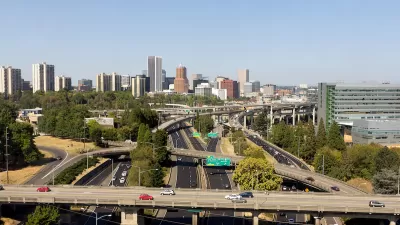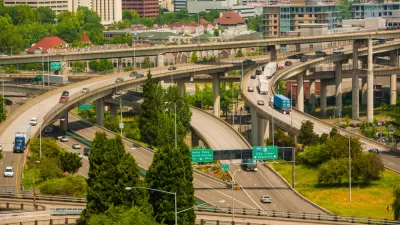An executive order ramps up the effort to lower emissions in the state, much of which come from transportation.

Earlier this month, Governor Kate Brown of Oregon signed Executive Order 20-04, directing state agencies and commissions to take steps to reduce and regulate greenhouse gas emissions. The order also mandates that state agencies work to reduce emissions to 45 percent below 1990 levels by 2035 and to 80 percent below 1990 levels by 2050.
About 40 percent of greenhouse gas emissions in Oregon are related to transportation, writes Jonathan Maus. "[This] action by Governor Brown says [the Oregon Department of Transportation] and [the Oregon Transportation Commission] have a legal requirement to reduce those emissions."
ODOT and OTC must also make implementation of the Oregon Statewide Transportation Strategy a priority. "Furthermore, the order directs ODOT to set metrics and then evaluate GHG impacts of all transportation projects in regional transportation plans," says Maus.
FULL STORY: Governor Brown’s executive order on climate change could have impacts on transportation

Maui's Vacation Rental Debate Turns Ugly
Verbal attacks, misinformation campaigns and fistfights plague a high-stakes debate to convert thousands of vacation rentals into long-term housing.

Planetizen Federal Action Tracker
A weekly monitor of how Trump’s orders and actions are impacting planners and planning in America.

In Urban Planning, AI Prompting Could be the New Design Thinking
Creativity has long been key to great urban design. What if we see AI as our new creative partner?

King County Supportive Housing Program Offers Hope for Unhoused Residents
The county is taking a ‘Housing First’ approach that prioritizes getting people into housing, then offering wraparound supportive services.

Researchers Use AI to Get Clearer Picture of US Housing
Analysts are using artificial intelligence to supercharge their research by allowing them to comb through data faster. Though these AI tools can be error prone, they save time and housing researchers are optimistic about the future.

Making Shared Micromobility More Inclusive
Cities and shared mobility system operators can do more to include people with disabilities in planning and operations, per a new report.
Urban Design for Planners 1: Software Tools
This six-course series explores essential urban design concepts using open source software and equips planners with the tools they need to participate fully in the urban design process.
Planning for Universal Design
Learn the tools for implementing Universal Design in planning regulations.
planning NEXT
Appalachian Highlands Housing Partners
Mpact (founded as Rail~Volution)
City of Camden Redevelopment Agency
City of Astoria
City of Portland
City of Laramie




























